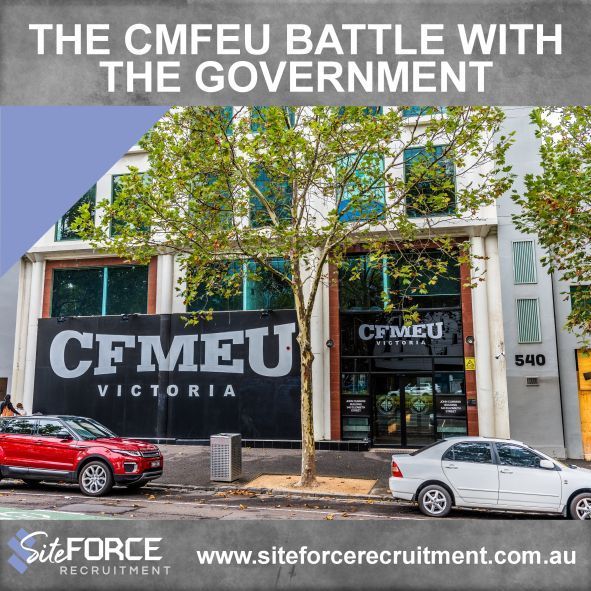THE CFMEU’S BATTLE WITH THE GOVERNMENT
A fight for power or fairness?

In recent months, the Construction, Forestry, Maritime, Mining and Energy Union (CFMEU) has found itself at the centre of a significant clash with the Australian government. The government's move to potentially place the CFMEU into administration has sparked a heated debate about the role of unions in the construction industry and the broader implications for workers, employers, and the economy.
As a labour hire specialist, I hold a deep respect for worker safety and maintain exceptionally high standards in this area to protect my workers, alongside a strong reputation for excellent management. In this article, I’ll share my insights into the ongoing situation, and offer my perspective on how the current environment is affecting labour hire companies like mine.
The 60 Minutes Expose
The recent 60 Minutes exposé on the CFMEU has added fuel to the fire, exposing what many see as the darker side of the union’s operations. The investigation revealed instances of alleged corruption, bullying, and intimidation within the union ranks, painting a troubling picture of how the CFMEU conducts its business. The program featured interviews with former union members and industry insiders who described a culture of fear and coercion, where dissent was often met with aggressive retaliation.
This exposé has intensified calls for greater oversight and reform within the CFMEU, with many questioning whether the union’s pursuit of power has come at the expense of its original mission to protect workers. The revelations have further complicated the public’s perception of the CFMEU, raising difficult questions about the balance between effective union representation and the abuse of power.
The 60 Minutes exposé also delved into the CFMEU's alleged connections to outlaw motorcycle gangs, a revelation that has caused significant concern among both the public and authorities. The investigation suggested that certain union officials had ties to these criminal organisations, raising alarms about potential infiltration and influence within the union's operations.
According to the exposé, these connections were not just peripheral but involved substantial interactions, including the use of bikie gangs for intimidation and enforcement purposes on construction sites. This revelation has cast a shadow over the union's credibility, as it implies that the CFMEU may have engaged in or turned a blind eye to illegal activities to maintain its dominance in the industry. The links to bikie gangs have intensified scrutiny on the union and bolstered the government's case for placing the CFMEU into administration, with many now questioning the integrity of the union's leadership and their commitment to lawful, ethical representation of their members.
The 60 Minutes exposé revealed that the CFMEU had allegedly expanded into several businesses tied to the construction industry, including labour hire firms, safety training organisations, and construction supply companies. These ventures, which extended beyond the union's traditional role, were reportedly created to generate revenue streams that benefited the union leadership rather than the members it was meant to represent. By controlling these ancillary businesses, the CFMEU could further influence the industry, ensuring that union-aligned companies received a competitive advantage while potentially sidelining non-union competitors. The investigation suggested that this consolidation of financial power further entrenched the union's dominance, blurring the lines between genuine union advocacy for its members and profit-driven ventures aimed at building a financial empire for the union and its leadership.
Government’s Move to Administration: Is It A Heavy-Handed Approach?
The government's decision to consider placing the CFMEU into administration comes after years of mounting tension between the union and various political entities. The CFMEU has long been a powerful force in the Australian construction sector, often taking an aggressive stance on workers' rights and site safety. However, the government argues that the union's conduct has crossed the line, leading to significant disruptions in the industry, particularly on Tier 1 sites, where large-scale projects are often delayed due to the CFMEU's interventions.
This move to administration is seen by some as an attempt to curtail the union's influence and bring more regulatory oversight to its activities. Critics of the union point to numerous incidents where CFMEU representatives have allegedly bullied contractors and workers, forcing them to adhere to union demands under the threat of site closures. These actions, they argue, have led to increased costs and delays, ultimately burdening the entire construction project. As a lot of these projects are government projects funded by us, the public, it is a cost and burden to all of us. Often a government purse can be seen as an open chequebook for those that can tap it.
The CFMEU’s Position: A Fight for Worker Representation
On the other hand, the CFMEU vehemently opposes the government's actions, framing them as an attack on workers' rights and unionism itself. The union has called for the replacement of Fair Work Australia and the current Commissioner, arguing that these bodies have failed to protect workers from exploitative practices and unsafe working conditions.
The CFMEU asserts that their actions on construction sites are necessary to ensure the safety and well-being of workers, particularly in an industry notorious for its high-risk environment. They maintain that site closures due to safety concerns are not arbitrary but are based on genuine risks that could endanger lives. The union’s leadership contends that their aggressive stance is the only way to hold employers accountable and ensure that safety regulations are strictly enforced.
CFMEU’s Influence: Monopolising Construction Sites?
The CFMEU's influence on Australian construction sites cannot be understated. With a strong presence across the country, the union has been able to enforce its policies and standards on most major construction projects. This dominance, however, has not come without controversy. Critics argue that the CFMEU has effectively monopolised the construction industry, making it difficult for non-unionised workers and contractors to compete.
A common complaint is that the union's practices create an environment where only those aligned with the CFMEU can operate freely. Non-union workers often find themselves ostracised or pressured to join the union, leading to a culture where being non-union is equated with being unwelcome. This has led to a perception that the CFMEU is less about worker representation and more about maintaining control over the industry. I would also say that there is another side to the argument that would include private enterprise opportunities being stopped where the CMFEU or its leadership have set up.
Staying in Their Lane: The Role of the CFMEU
While the CFMEU has an important role in representing its members, there is growing sentiment that the union needs to refocus on its core mission rather than trying to dominate the entire construction sector. Unions are essential for protecting workers' rights, but when they overstep, they risk alienating not just employers but also the broader workforce.
The idea of a fair opportunity culture is one where all workers, regardless of union affiliation, are given an equal chance to contribute and succeed. This is increasingly seen as a necessary step in fostering a more inclusive and productive construction industry. The CFMEU's heavy-handed tactics, critics argue, run counter to this ideal, creating divisions rather than unity.
Towards a Fairer Construction Sector
I believe the ongoing battle between the CFMEU and the government highlights the need for a balanced approach to unionism in the construction industry. A more positive and fair opportunity culture would involve recognising the rights of all workers while ensuring that unions do not overextend their influence to the detriment of the industry as a whole.
Reform, rather than administration, might be a more constructive path forward, one that involves all stakeholders in creating a safer, fairer, and more efficient construction sector. The CFMEU has a critical role to play in this, but it must do so with an eye towards collaboration rather than confrontation.
Fair Market Opportunity from a Labour Hire Company Perspective
As a labour hire provider in the construction industry, the influence of unions like the CFMEU can significantly impact business prospects. If my workers are not part of the union, it creates substantial limitations on the market and potential opportunities. Many construction sites, particularly those under the union's influence, prefer or even require that workers be union members to avoid conflicts and ensure smooth operations. This preference for unionised labour means that non-union labour hire companies often find themselves excluded from lucrative contracts and projects. The result is a restricted market where the ability to compete is diminished, and opportunities for growth are stifled. This environment not only limits business potential but also perpetuates a culture where being part of the union is seen as a prerequisite for success, rather than a choice for workers and employers alike.
Fair market opportunity in the construction industry is about creating an environment where all businesses, regardless of union affiliation, have an equal chance to compete and succeed. It means that contracts and projects should be awarded based on merit, quality, and cost-effectiveness, not on whether a company’s workforce is unionised. Ensuring fair market opportunity involves removing barriers that favour certain groups or organisations over others, allowing for a more diverse and competitive industry. When the market is truly fair, it promotes innovation, efficiency, and better outcomes for all stakeholders—contractors, workers, and clients. This approach not only supports healthy competition but also helps to break down monopolistic practices that can stifle growth and limit opportunities for non-union businesses and workers.
Final Thoughts
The current situation with the CFMEU is a complex and multifaceted issue. While the union’s dedication to safety and workers’ rights is commendable, its methods and the resulting impact on the industry appear to warrant scrutiny. As Australia moves forward, the challenge will be finding a way to balance these concerns while promoting a fair and competitive construction sector that benefits all.
Our Superpower
Our leading 'superpower' is attracting and retaining quality team members who share our values of honesty, integrity, diligence, and service, allowing us to deploy quality team members on client sites quickly.
Our team member's superpower is being motivated, prepared and ready to enthusiastically contribute to the projects at hand, more than just a pair of hands.
Related articles:
Read other informative articles for both employers and workers at: https://www.siteforcerecruitment.com.au/blogs
Chantal Penny is the Director with Superpowers of SiteForce Recruitment. A thought leader in the industry, Chantal, based on her expertise and industry perspective, offers unique guidance, inspiration, and influence in the industry. Chantal Penny is also a thought leader in the industry with her Podcast, Talent Instinct, which is available at:
https://talentinstinctpodcast.libsyn.com/site
At SiteForce Recruitment, we specialise in labour-hire and permanent recruitment in the construction industry. We are committed to valuing people, safety and wellbeing, collaboration, trust and, of course – results!
CONNECT with us via our contact page or bookings links on our website if you are looking to recruit for, get your dream job, or join our amazing labour force team.











